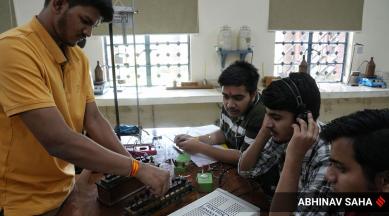Stay updated with the latest - Click here to follow us on Instagram
Starting August, Delhi University to also offer engineering degrees
The Executive Council also approved the four-year Integrated Teacher Education Programme (ITEP) from the 2023-24 academic session.

Come August, Delhi University will offer B.Tech degrees in Computer Science and Engineering; Electronics and Communication Engineering; and Electrical Engineering. This was approved during the Executive Council meeting Friday.
A total of 360 students will be admitted under these, with 120 students for each B.Tech programme. Admissions will be done based on the JEE Mains score. The course structure, credit distribution and syllabi for the first two semesters of the programme have been finalised.
Shyama Prasad Mukherji College for Women, Mata Sundri College for Women and Jesus and Mary College have been granted approval to introduce ITEP by the National Council for Teacher Education (NCTE) from the coming session.
The Indian Express in May had reported that DU’s Bachelor of Elementary Education (B.El.Ed) programme is set to be replaced with ITEP starting this year, which was met with opposition by several teachers.
Meanwhile, EC members Seema Das and Rajpal Singh Pawar opposed DU’s strategic plan for the next 25 years which was presented in the meeting and later deferred. They said it is a “clear blueprint for the privatisation and contractualisation of the university”.
As reported by The Indian Express on June 3, ‘Envisage DU 2047’ includes several strategic goals such as a postgraduate programme in Artificial Intelligence and Machine Learning, development of herbal products along with focus on drug discovery and nanomedicine, visits by at least five Nobel Laureates, and development of a science village.
The EC meeting also passed a resolution on capping the student-teacher ratio, which recently caused a furore among the teaching community.
Last month, the university had issued a notification stating that class sizes for lectures and tutorials have been capped at 60 and 30 respectively. Three EC members disapproved of the use of emergency powers by the V-C over the matter, terming it an “anti-student” and “unacademic” policy.
Other resolutions that were approved included the five-year LLB programme, setting up the Centre for Independence and Partition Studies, formation of a Tribal Studies Centre and a Masters programme in Hindu Studies.